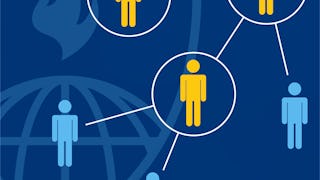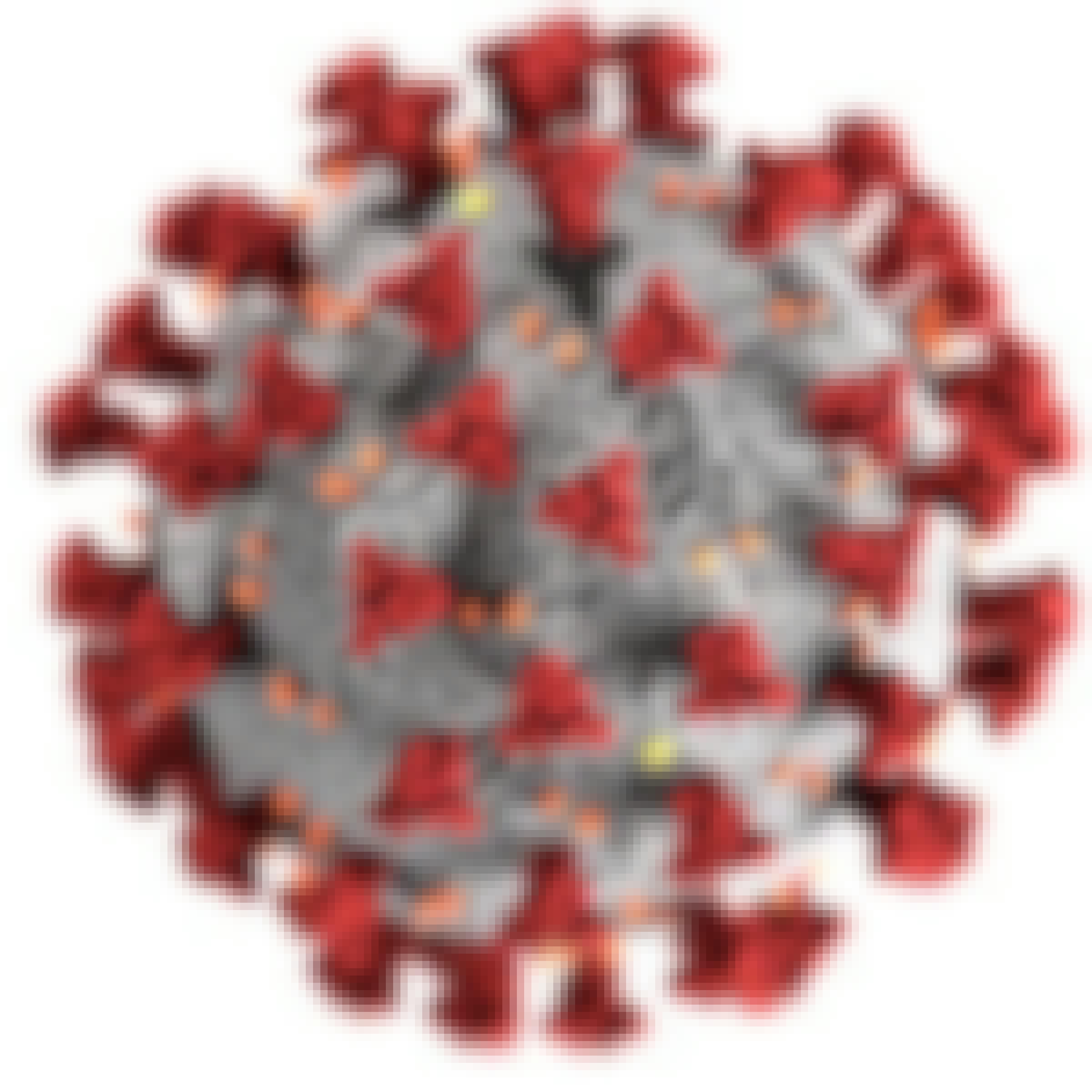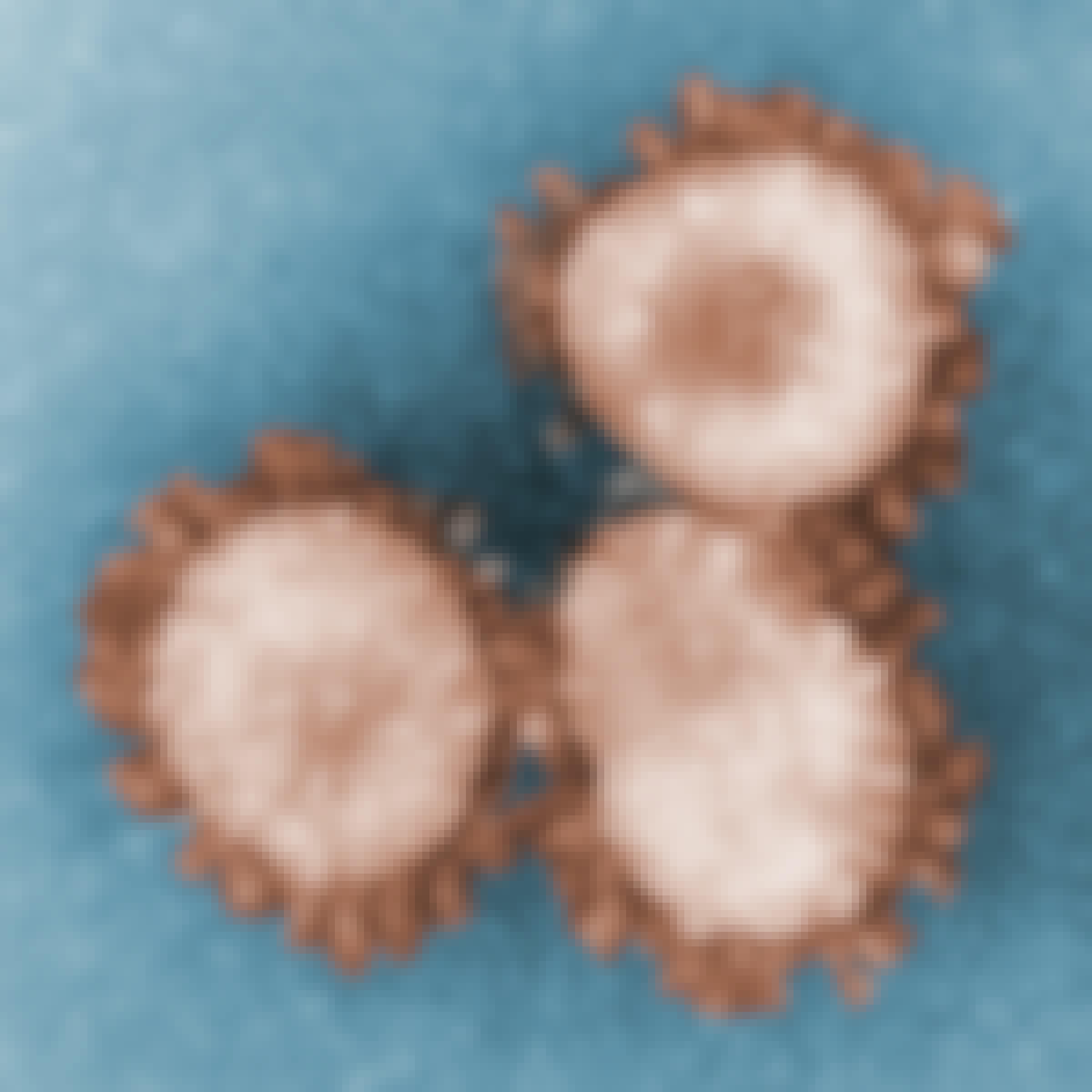- Browse
- Covid 19
Results for "covid-19"
 Status: PreviewPreviewO
Status: PreviewPreviewOOsmosis
Skills you'll gain: Infectious Diseases, Infection Control, Public Health, Epidemiology, Primary Care, Diagnostic Tests, Health Care, Critical Care, Personal protective equipment, Patient Evaluation, Maternal Health, Clinical Practices, Community Health
4.8·Rating, 4.8 out of 5 stars7K reviewsBeginner · Course · 1 - 4 Weeks
 Status: FreeFreeJ
Status: FreeFreeJJohns Hopkins University
Skills you'll gain: Interviewing Skills, Rapport Building, Interpersonal Communications, Active Listening, Epidemiology, Healthcare Ethics, Infectious Diseases, Investigation, Public Health and Disease Prevention, Public Health, Health Technology, Community Health, Medical Privacy
4.9·Rating, 4.9 out of 5 stars95K reviewsBeginner · Course · 1 - 3 Months

Skills you'll gain: Data Import/Export, Model Evaluation, No-Code Development, Exploratory Data Analysis, Predictive Modeling, Applied Machine Learning, Data Pipelines, Data Manipulation, Data Preprocessing, Machine Learning, Time Series Analysis and Forecasting
4.5·Rating, 4.5 out of 5 stars60 reviewsBeginner · Guided Project · Less Than 2 Hours
 Status: Free TrialFree TrialL
Status: Free TrialFree TrialLLearnQuest
Skills you'll gain: Data Preprocessing, Feature Engineering, Model Evaluation, Bioinformatics, Exploratory Data Analysis, Random Forest Algorithm, Pandas (Python Package), Scikit Learn (Machine Learning Library), Applied Machine Learning, Data Manipulation, Dimensionality Reduction, Data Cleansing, Keras (Neural Network Library), Data Transformation, NumPy, Classification Algorithms, Tensorflow, Artificial Neural Networks, Machine Learning, Data Science
3.2·Rating, 3.2 out of 5 stars82 reviewsBeginner · Specialization · 3 - 6 Months
 Status: Free TrialFree TrialU
Status: Free TrialFree TrialUUniversity of Pennsylvania
Skills you'll gain: Human Capital, Employee Retention, Workforce Development, Human Resource Strategy, Employee Training, Digital Transformation, Organizational Strategy, Employee Engagement, Supply Chain Management, Human Resources Management and Planning, E-Commerce, Customer experience strategy (CX), Brand Strategy, Analytics, Talent Management, Retail Store Operations, Marketing Strategies, Business Technologies, Customer Insights, Performance Management
4.7·Rating, 4.7 out of 5 stars414 reviewsBeginner · Specialization · 1 - 3 Months
 Status: PreviewPreviewI
Status: PreviewPreviewIInstitute for the Future
Skills you'll gain: Organizational Leadership, Visionary, Crisis Management, Forecasting, Business Continuity Planning, Resilience, Risk Analysis, Adaptability, Systems Thinking, Social Impact, Strategic Thinking, Innovation, Change Management, Trend Analysis, Social Justice
4.8·Rating, 4.8 out of 5 stars55 reviewsBeginner · Course · 1 - 4 Weeks
What brings you to Coursera today?
 Status: Free TrialFree TrialR
Status: Free TrialFree TrialRRutgers the State University of New Jersey
Skills you'll gain: Supplier Quality Management, Procurement, Strategic Sourcing, Enterprise Resource Planning, Purchasing, Environmental Social And Corporate Governance (ESG), Strategic Partnership, Business Risk Management, Key Performance Indicators (KPIs), Supplier Relationship Management, Supply Chain, Risk Management, Derivatives, Organizational Structure, Consolidation, Target Audience, Talent Management, Quality Management, Robotic Process Automation, Supply Chain Management
4.6·Rating, 4.6 out of 5 stars90 reviewsIntermediate · Specialization · 3 - 6 Months
 Status: PreviewPreviewU
Status: PreviewPreviewUUniversity of Illinois Urbana-Champaign
Skills you'll gain: Supply Chain Management, Supply Chain, Supply Chain Planning, Supply Management, Supplier Management, Materials Management, Risk Management, Risk Mitigation, Logistics Management, Logistics, Crisis Management, Supplier Relationship Management, Contingency Planning, Manufacturing Operations, Demand Planning, Case Studies, Personal protective equipment, Operational Efficiency, Capacity Management, Business Strategies
4.7·Rating, 4.7 out of 5 stars140 reviewsBeginner · Course · 1 - 4 Weeks
 Status: Free TrialFree TrialU
Status: Free TrialFree TrialUUniversity of California San Diego
Skills you'll gain: Bioinformatics, Diagnostic Tests, Model Evaluation, Molecular Biology, Infectious Diseases, Informatics, Network Analysis, Medical Science and Research, Computational Thinking, Biochemistry, Data Mining, Scientific Visualization, Life Sciences, Tree Maps, Microbiology, Biology, Data Analysis Software, Pharmacology, Science and Research
4.4·Rating, 4.4 out of 5 stars66 reviewsBeginner · Specialization · 1 - 3 Months
 Status: PreviewPreviewU
Status: PreviewPreviewUUniversity of Florida
Skills you'll gain: Infectious Diseases, Infection Control, Epidemiology, Preventative Care, Critical Care, Public Health, Mechanical Ventilation, Socioeconomics, Patient Treatment, Diagnostic Tests, Immunology, Personal protective equipment, Laboratory Testing, Clinical Assessment
4.7·Rating, 4.7 out of 5 stars344 reviewsIntermediate · Course · 1 - 4 Weeks
 Status: FreeFreeX
Status: FreeFreeXXi'an Jiaotong University
Skills you'll gain: Infectious Diseases, Infection Control, Epidemiology, Public Health and Disease Prevention, Preventative Care, Public Health, Hand Hygiene, Personal protective equipment, Diagnostic Tests, Intensive Care Medicine, Patient Treatment, Diagnostic Radiology
4.5·Rating, 4.5 out of 5 stars360 reviewsBeginner · Course · 1 - 3 Months
 Status: FreeFreeA
Status: FreeFreeAAmerican Museum of Natural History
Skills you'll gain: Health Disparities, Social Determinants Of Health, Infectious Diseases, Immunology, Epidemiology, Public Health, Pathology, Microbiology, Mathematical Modeling, Molecular Biology, Taxonomy, Cell Biology, Diagnostic Tests, Clinical Trials
4.8·Rating, 4.8 out of 5 stars48 reviewsIntermediate · Course · 1 - 3 Months
What brings you to Coursera today?
Searches related to covid-19
In summary, here are 10 of our most popular covid-19 courses
- COVID-19: What You Need to Know: Osmosis
- COVID-19 Contact Tracing: Johns Hopkins University
- Build your first Machine Learning Pipeline using Dataiku : Coursera
- AI for Scientific Research: LearnQuest
- Omnichannel Retail Strategy: University of Pennsylvania
- Life After COVID-19: Get Ready for our Post-Pandemic Future: Institute for the Future
- Advanced Global Procurement and Sourcing: Rutgers the State University of New Jersey
- Managing Supply Chain Disruption During COVID-19: University of Illinois Urbana-Champaign
- Applied Bioinformatics: University of California San Diego
- COVID-19 - A clinical update: University of Florida
Frequently Asked Questions about Covid 19
COVID-19 is a highly contagious and potentially deadly disease that has spread rapidly around the world since its discovery in December 2019. While most people infected with COVID-19 experience no symptoms or mild to moderate respiratory symptoms, older individuals or those with underlying conditions such as diabetes, cardiovascular disease, or chronic respiratory illness in particular face an elevated risk of more serious complications or even death. COVID-19 was declared a pandemic by the World Health Organization in March 2020, and as of July 2020 there have been over 10 million confirmed cases and half a million deaths recorded worldwide.
This pandemic is the greatest public health crisis of the 21st century, and it is especially important to learn about because there remains much we do not yet know about this disease. For example, while we know that COVID-19 is a novel type of coronavirus - a family of viruses affecting humans as well as animals that includes the common cold - we do not fully understand what makes its symptoms so unusual. And, while we know that the main way the virus is transmitted is through droplets of saliva, there is still much we need to learn about how community spread occurs.
Unless and until an effective vaccine is discovered, it will be critical for everybody to continue learning about how to reduce the spread of the COVID-19. To the extent that there have been successes in “flattening the curve” of transmission, they have been the result of individuals around the world collectively taking action in accordance with evolving public health knowledge of this unprecedented pandemic. This ongoing process of learning - and the accompanying fight against the spread of misinformation about the virus - will remain essential to protecting life for the foreseeable future.
Mounting an effective response to COVID-19 isn't just a job for doctors treating patients on the front lines, or for scientists working to develop a vaccine. Because the steps required to manage the spread of this highly contagious disease touch on so many aspects of our lives, an understanding of COVID-19 is important for professionals across a diverse range of fields. Policymakers have to balance public health protections with potential concerns about impacts on the economy and civil liberties; logistics and operations managers have had to maintain essential supply chains while implementing new safety protocols; and educators have had to transition to online learning while also determining whether, when, and how to return to in-person schooling.
Outside of doctors themselves, epidemiologists have been perhaps the most important health professionals helping to navigate our response to the pandemic. These public health experts, including high profile officials such as Dr. Anthony Fauci of the Center for Disease Control and Prevention, study the way diseases spread and help develop solutions to mitigate their impacts. Because health statistics are central to epidemiology, these professionals often rely on Python programming and other data science tools to uncover patterns and assist with data analysis. According to the Bureau of Labor Statistics, epidemiologists typically have a masters degree in public health and earn a median annual salary of $70,990.
Absolutely. The pandemic has made online education more important in all areas, and Coursera now offers a variety of courses on COVID-19 to help learners from all backgrounds better understand this disease. These include courses on topics such as COVID-19 clinical studies, contact tracing, mental health, and more offered by top-ranked universities such as Johns Hopkins University, the University of Houston, the University of Florida, and Imperial College London.
If you’re interested in data science, Coursera also offers Guided Projects with hands-on tutorials to demonstrate how data analysis is used in epidemiology. And, if you aspire to a career in epidemiology or public health yourself, you can even pursue a full-fledged Master of Public Health (MPH) degree from Imperial College London, a leading institution in global efforts to understand this pandemic.
The skills or experience you may need to have before learning about COVID-19 include working in a health care setting as a physician, nurse, or another role that has frequent interaction with patients. It may also be beneficial for you to have the skills or experience in administering vaccines to patients. If you have a background in writing about health care in the media or for clinical and research purposes, you may already have the skills or experiences necessary to learn about COVID-19.
The kind of person best suited to learn about COVID-19 is one who needs to be prepared to recognize, stabilize, and treat patients with the virus. Someone who may benefit from learning about COVID-19 needs to learn key skills quickly, including the need for contact tracing and learning how to use it as an effective public health intervention. The type of person who is well suited to learn about COVID-19 is also interested in the science and presentation of the virus in patients. You might also be interested in how the disease developed, where it came from, why it has rapidly spread across the globe to create a pandemic, and how to slow the spread of infection. Also, someone who is interested in the history and future of vaccines, how they work, and why some patients fear vaccinations may be a good candidate to learn about COVID-19.
Learning about COVID-19 may be right for you if you need to keep up with the information and misinformation about the virus and if you need to better understand the symptoms and signs in patients with the virus, early stabilization of patients, preventing the need for intubation, and ventilator management. It may also be right for you if you need to better understand the ethics behind proper contact tracing and quarantining and how to overcome the barriers often encountered when trying to establish contact tracing. Studying COVID-19 is right for you if you want to understand how the virus invades respiratory epithelial cells, grows in nasal passages, and spreads to alveoli to cause hypoxia. It may also be a relevant field of study if you need to learn the current treatments for the disease and the treatments that are now under investigation and research.










